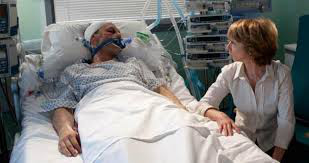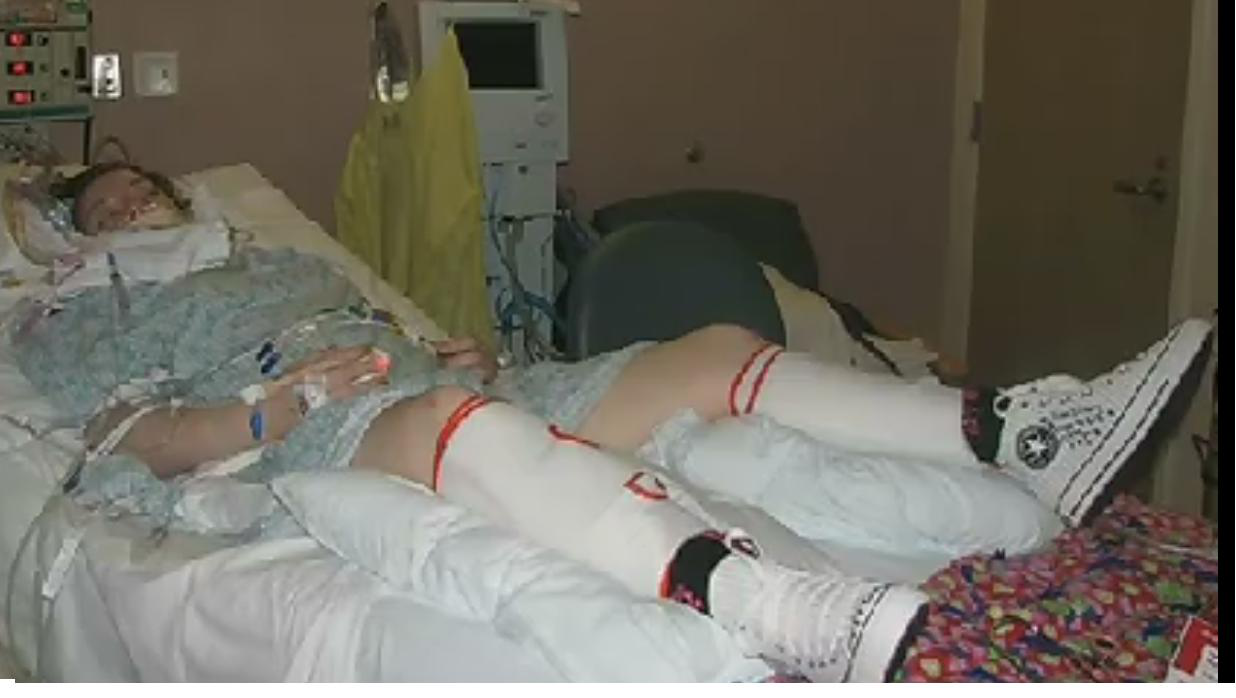Podcast: Play in new window | Download
Subscribe: Apple Podcasts | RSS
Hi, it’s Patrik Hutzel from INTENSIVECAREHOTLINE.COM, where we instantly improve the lives for Families of critically ill Patients in Intensive Care, so that you can make informed decisions, have PEACE OF MIND, real power, real control and so that you can influence decision making fast, even if you’re not a doctor or a nurse in Intensive Care!
This is another episode of “YOUR QUESTIONS ANSWERED“ and in last week’s episode I answered another question from our readers and the question last week was
You can check out the answer to last week’s question by clicking on the link here.
In this week’s episode of “YOUR QUESTIONS ANSWERED“, I want to answer another frequently asked question from our readers and the question this week is
Why is a critically ill Patient not “waking up” from an induced coma?
One of the biggest frustrations for families of critically ill Patients in Intensive Care is that they are having a loved one critically ill that’s in an induced coma and is not “waking up”!
It’s one of the most frustrating situations families in Intensive Care are facing because their loved one all of a sudden is unable to communicate with them and the outside world, even though they are right in front of them!
I can’t tell you how many families in Intensive Care come to us on a daily or weekly basis with this number one frustration and they are all saying the same thing!
“My loved one is in Intensive Care on a ventilator, they are in an induced coma and they are not “waking up”? Why?”
Or they are saying something along the lines of
“My loved one has been in an induced coma and on a ventilator for two weeks now and they have been out of the induced coma for the last week and they are not “waking up”? What should we do, when will my loved one “wake up”?
Our role here at INTENSIVECAREHOTLINE.COM really is to not only answer your questions but even more so to give you and your family perspective!
Besides answering your questions, I believe giving you perspective of what’s happening when you’re having a loved one critically ill in Intensive Care is crucial!
Without having perspective when you’re having a loved one critically ill in Intensive Care it’s very easy to lose sight, it’s very easy to lose hope and it’s very easy to lose faith!
Therefore, my first response to this question of
“Why is a critically ill Patient not “waking up” from an induced coma?”
Let me tell you this and I know it’s probably not what you expect and it’s probably not what you want to hear.
Your loved one will “wake up” when the time is right and when they are ready for it.
Let me say this again, because it’s so important.
Your loved one will “wake up” when the time is right and when they are ready for it.
Yes, I can hear you saying, “but my loved one has been in Intensive Care now for two weeks and all they do is twitching their eyes or moving their hands or their fingers and they even try and squeeze hands on occasion, shouldn’t they be “waking up” by now?”
One of the biggest challenges in life in general is that we all like to achieve our goals with certain deadlines that are self-imposed. For example we want to lose weight or we want to get a promotion or whatever…and we want it within certain time frames…
And if we apply the same framework and the same mindset to “waking up” after an induced coma in Intensive Care we are seeing very quickly that this approach is doomed to fail.
“Waking up” in Intensive Care after an induced coma is a process and not an event!
What do I mean by that?
“Waking up” after an induced coma in Intensive Care is like switching on a light with a dimmer and not with a switch.
It’s often a slow process that can take days or sometimes even weeks. In case of head and brain injuries it can sometimes take months.
The three “P’s” patience, positivity and persistence are often your biggest assets when it comes to waiting for your loved one to “wake up” after an induced coma.
So why is your loved one not “waking up” after an induced coma?
There are a number of reasons why your critically ill loved one hasn’t woken up after the induced coma yet.
And there is no “one size fits all” when it comes to not “waking up” after an induced coma.
There simply is no such thing as exactly predicting when your loved one will “wake up” after coming out of an induced coma.
Let’s look at some of the most common reasons what causes a delay for your critically ill loved one to “wake up” after an induced coma.
- Your critically ill loved one has been heavily sedated with either Midazolam (Versed), Morphine or Fentanyl for prolonged periods of time, usually anything > 7 days is prolonged
- Your critically ill loved one had anaesthesia for surgery before or during their stay in Intensive Care
- Your loved one has complications such as severe sepsis, kidney failure, liver failure, stroke, multiple trauma, head or brain injuries, ARDS (lung failure), ECMO etc…
- Your critically ill loved one had a cardiac arrest
- Your critically ill loved one is above the age of 65
Now, as a rule of thumb age can be a factor but doesn’t necessarily have to be a factor when it comes to a delay in “waking up” after an induced coma.
Related articles/videos:
There is a definitely a higher chance that with increasing age, “waking up” after an induced coma is delayed, however it doesn’t have to be.
I have seen critically ill Patients >65 years of age taking a long time to “wake up” after an induced coma and I have seen critically ill Patient in their 70’s and 80’s “waking up” perfectly fine after an induced coma, despite prolonged critical illness.
Again, there is no “one size fits all”!

But the biggest challenge is often that families in Intensive Care expect their loved ones to “wake up” quickly after sedatives such as Propofol(Diprivan) and/or Midazolam(Versed) have been taken off.
Please keep in mind that with the sedatives being given for the induced coma such as Propofol (Diprivan) and/or Midazolam (Versed) your critically ill loved one is usually also getting Opiates (=pain relief) such as Morphine or Fentanyl.
The combination of sedatives and opiates is necessary to be able for your critically ill loved one to tolerate mechanical ventilation and the breathing tube.
It’s very painful and uncomfortable to be able to tolerate mechanical ventilation and the breathing tube without being induced into a coma.
There is no such thing as mechanical ventilation without an induced coma and vice versa. One goes with the other, period.
There is always the odd exception to the rule such as when people are in a natural coma after severe head or brain injuries but in 99% of the cases induced coma is simultaneously followed by mechanical ventilation with a breathing tube and vice versa.
And because sedatives and opiates accumulate in the body and are not getting out of the body system straight away after they have been taken away, there is often a delay in “waking up”.
Furthermore, there is also a difference that is important to notice when it comes to sedation and induced coma.
Most critically ill Patients when first induced into a coma are sedated with a drug called Propofol (Diprivan).
Related:
Propofol (Diprivan) is a short acting sedative and it works very quickly after being given and it also stops working quickly when taken away.
Therefore critically ill Patients after an induced coma that have been on Propofol (Diprivan) should “wake up” quicker often within minutes or hours after it has been ceased.
That’s very often the case in short term induced comas ( 72 hours, taking away Propofol(Diprivan) doesn’t guarantee “waking up” quickly.
One of the reasons why “waking up” quickly after the use of a short acting sedative such as Propofol(Diprivan) is not being guaranteed is simply that Opiates(=pain killers) such as Morphine or Fentanyl can delay “waking up” as well.
Critical illness in Intensive Care often comes with a lot of pain attached to it, because of either the critical illness itself and/or because of the treatment attached to it.
Therefore adequate pain control is paramount and also has its (undesired) side effects.
Morphine or Fentanyl being given intravenously during the induced coma has sedative effects too and often delays “waking up” as well.
Besides Morphine and Fentanyl being strong pain killers and having a sedative effect, they also have side effects such as respiratory depression, meaning that when your critically ill loved one is slowly “waking up” they are not breathing up as quickly as they should because of the Morphine or the Fentanyl having those undesired side effects.
Therefore “waking up” after an induced coma also needs to go hand in hand with breathing up on the ventilator.
Besides “waking up” and following simple commands such as squeezing fingers, opening eyes or poking out their tongue, your critically ill loved one also needs to be able to breathe independently before they can be taken off the ventilator.
And if your critically ill loved one is sedated for >72 hours or for even longer, Midazolam(Versed) is often being the sedative of choice, just because it is a longer term acting sedative and has better effects for longer term induced comas.
When it comes to “waking up” from the induced coma, Midazolam (Versed) needs to be more gradually reduced compared to Propofol(Diprivan) simply because it’s a Benzodiazepine and “Benzos” can be addictive in nature.
Therefore a gradual weaning off the Midazolam(Versed) when coming out of an induced coma should be followed in order to avoid any withdrawal symptoms.
There should also be a gradual and not abrupt reduction in Opiates(=pain killers) such as Morphine or Fentanyl as they can be addictive in nature too. Therefore any abrupt cessation of Morphine or Fenatnyl can cause withdrawal symptoms too.
With that in mind, you can see that the combination of a prolonged induced coma with Midazolam(Versed) and Opiate(=pain killer) use such as Morphine or Fentanyl will cause a delay in “waking up”. They are very strong and potent drugs and they take their time to get out of the system.
On top of that there are other reasons just simply that your loved one is battling a critical illness!
Your loved one just simply needs time to recover from such a massive event like a critical illness!
Therefore, even though they may be more awake after they are slowly coming out of the induced coma, your critically ill loved one may still need more time to “wake up” simply because they are recovering from the critical illness!
Imagine if your loved one just had such a massive event like a cardiac arrest, major trauma, cardiac surgery, stroke, ARDS(Lung failure), Pneumonia, Guillan barre syndrome, Seizures, Heart attack, Sepsis, liver failure or ECMO of course they will need time to “wake up”!
Again “waking up” after an induced coma is like switching on a light with a dimmer and not with a flick of the switch.
Keep that in mind at all times!
Your friend
Patrik Hutzel
How can you become the best advocate for your critically ill loved one, make informed decisions, get peace of mind, control, power and influence quickly, whilst your loved one is critically ill in Intensive Care?
You get to that all important feeling of making informed decisions, get PEACE OF MIND, CONTROL, POWER AND INFLUENCE when you download your FREE “INSTANT IMPACT” report NOW by entering your email below!
In Your FREE “INSTANT IMPACT” report you’ll learn quickly how to make informed decisions, get PEACE OF MIND, real power and real control and how you can influence decision making fast, whilst your loved one is critically ill in Intensive Care! Your FREE “INSTANT IMPACT” Report gives you in-depth insight that you must know whilst your loved one is critically ill or is even dying in Intensive Care!
Sign up and download your FREE “INSTANT IMPACT” REPORT now by entering your email below! In your FREE “INSTANT IMPACT” REPORT you’ll learn how to speak the “secret” Intensive Care language so that the doctors and the nurses know straight away that you are an insider and that you know and understand what’s really happening in Intensive Care! In your FREE report you’ll also discover
- How to ask the doctors and the nurses the right questions
- Discover the many competing interests in Intensive Care and how your critically ill loved one’s treatment may depend on those competing interests
- How to eliminate fear, frustration, stress, struggle and vulnerability even if your loved one is dying
- 5 mind blowing tips& strategies helping you to get on the right path to making informed decisions, get PEACE OF MIND, control, power and influence in your situation
- You’ll get real world examples that you can easily adapt to your and your critically ill loved one’s situation
- How to stop being intimidated by the Intensive Care team and how you will be seen as equals
- You’ll get crucial ‘behind the scenes’ insight so that you know and understand what is really happening in Intensive Care
- How you need to manage doctors and nurses in Intensive Care (it’s not what you think)
Thank you for tuning into this week’s YOUR QUESTIONS ANSWERED episode and I’ll see you again in another update next week!
Make sure you also check out our “blog” section for more tips and strategies or send me an email to [email protected] with your questions!
Or you can call us! Find phone numbers on our contact tab.
Also check out our Ebook section where you get more Ebooks, Videos and Audio recordings and where you can also get 1:1 counselling/consulting with me via Skype, over the phone or via email by clicking on the products tab!
This is Patrik Hutzel from INTENSIVECAREHOTLINE.COM and I’ll see you again next week with another update!






